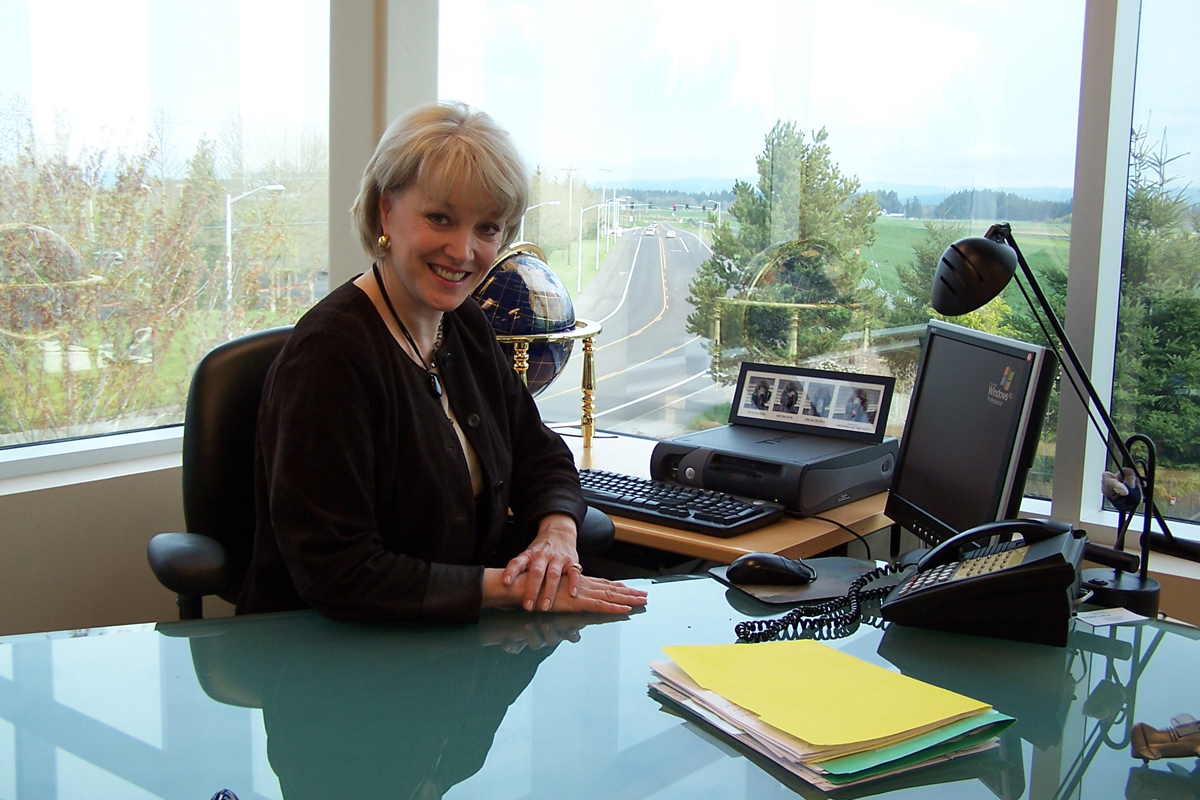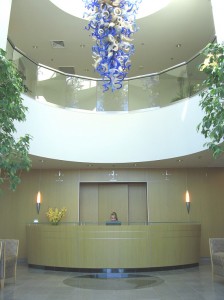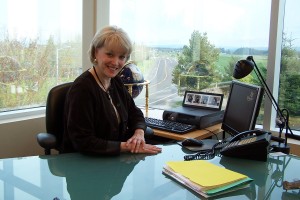
Flo Newton founded Global Aviation at Portland-Hillsboro Airport in 1995. Today, it’s a national leader in providing executive charter flights.
By Terry Stephens
In just 13 years, Flo Newton’s Global Aviation has become a national favorite in the highly competitive world of business jetliner charters, recognized by Fortune 500 executives, celebrities and private jet operators as the premier fixed base operation in the Pacific Northwest.
She credits her company’s popularity to its top-flight personalized care of clients, attention to detail, skilled aircraft maintenance and outstanding trip management performance. Based at Portland-Hillsboro Airport (HIO), Oregon’s second busiest airfield with more than 220,000 annual flight operations, Global Aviation operates a fleet of six Lear, Hawker, Challenger and Falcon business aircraft.
Employing 53 people, Newton promotes Global Aviation as a financially sound business with no debt, which gives the growing company more options for expansion.
“We already have two 24,000-square-foot hangars for our leased planes and a smaller 15,000-square-foot hangar,” Newton said. “But our growth has been so strong that we’re preparing to add a 27,000-square-foot hangar and add additional secure parking. We’re going to expand our executive offices, passenger terminal and crew lounge.”
She’s also been promoting international flights, publicizing Global Aviation’s closer proximity to Asian destinations than most other airports, based on the Hillsboro airfield’s location on great circle routes. Even European charters are arranged for clients planning business travel in those countries.
“One of our advantages is that Hillsboro is much more competitive in fuel pricing and landing fees than nearby Portland International,” she said. “We also have much less congestion in both ground and air traffic.”
Developments driving Global Aviation’s growth, and the entire private jet charter business, include rising commercial airline travel costs, delays getting to major airports, contending with crowds, long security checkpoint lines and airline problems with delayed or canceled flights, she said. For business executives or other travelers who charter business jet flights, it’s a matter of trading the hassles of commercial flights for the comforts of individualized flight scheduling, spacious executive offices for conducting work along the way, timesaving advantages for point-to-point trips and options for reaching multiple destinations in a day’s flight.
“Years ago, many people weren’t thinking as much about charter flights,” Newton said. “Today’s worsening commercial air travel conditions and increased travel demands for businesses are making corporate flying much more attractive.”
She also noted that the cost of chartering flights is far less than keeping corporate planes on the balance sheet. Global’s fleet of seven-to-nine passenger executive aircraft is leased at a variety of rates, including a Lear 35 at $2,450 an hour, a larger Lear 45 at $3,100 and a Challenger 604 for $4,900. Global also offers a Hawker 800SP, available hourly at $3,400, and a Lear 60 at $3,300. In June, the charter service added a Falcon 900EX to handle its clients’ growing needs.
Global also sets up ground travel, lodging or other necessary arrangements.
“We’ve even using today’s higher fuel prices as an opportunity to save our clients money by developing our own Fuel Economics Dispatcher,” Newton said. “That’s the fuel purchasing program we use to achieve the lowest possible pricing. In March, we saved clients an estimated $5,000.”
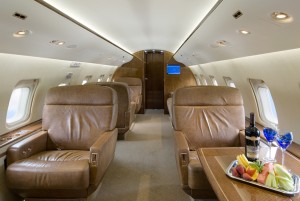
Corporate jet interiors come in a variety of styles and arrangements, including this one set up for both work and relaxation.
Global’s performance and growth have attracted attention from more than Newton’s executive flight clients. Eastern Aviation Fuels, the exclusive United States dealer for Shell Aviation fuels, recently chose Global Aviation to join its branded FBO network. That agreement brought Shell jet fuel back to the Pacific Northwest for the first time since the 1980s.
“Global Aviation’s facility is one of the nicest FBO I’ve even experienced,” said Lynn Weyerhaeuser, customer service manager for Eastern Aviation Fuels.
Newton said Shell Aviation is a world leader, having been named early in 2008 as the best international jet fuel marketer for the second consecutive year.
Newton’s company is approved as a Federal Aviation Administration repair station and has become an authorized Bombardier maintenance facility for Learjet, Challenger and Global Express aircraft. Its service center provides maintenance for models of Gulfstream, Dassault, Hawker, Cessna Citation, Embraer and Pilatus aircraft.
Global’s success has been tied to increasing interest in executive jet services. The planes are leased for numerous reasons other than avoiding large commercial airports: lease payments are usually tax deductible as business expenses, buying a corporate plane includes the additional cost of maintenance and aircrews, and leasing frees corporate funds for revenue-producing investments.
Also, executives have the advantage of traveling only with people they know, either guests or staff, and can enjoy gourmet meals, complimentary in-flight movies, roomy leather seats and flights that leave when they want to fly, not when an airline decides to fly.
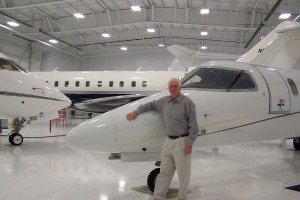
Maintenance director Brian Lockhart keeps two hangars of aircraft in top flying condition, as well as providing services for clients’ aircraft.
Newton has come a long way with her business in just a few years. She built her services on her experience running a charter service from 1981 to 1995 for Louisiana-Pacific, a major timber products company. She not only headed the company’s sideline business, but also often served as a flight attendant. That’s when she developed her reputation for keen attention to detail and a deep understanding of the needs of corporate fliers.
When Louisiana-Pacific closed that service, she opened an independent air charter business, operating from her home.
“I had a lot of experience and connections and knew a lot of people who were good customers with Louisiana-Pacific,” she said. “I started booking flights for them with private jets owned by other companies.”
As her business grew, she leased a 24,000-square-foot hangar at HIO in 1997, hired a mechanic and two pilots, brought three corporate jets into the hangar and began operating Global Aviation on a larger scale. By January 2000, her hangar was filled, so she added a second one with space for a luxury suite of offices, opening the new facilities in August 2001.
Her thriving business hit downdrafts after the Sept. 11 terrorist attacks, when executives responded to the resulting recession by restricting or eliminating corporate charter flights. Within months, however, the corporate travel market began reviving, and many companies began offering their planes for charter service to offset ownership costs. By early 2004, her business activity had nearly returned to pre-Sept. 11 levels. Since then, her business has expanded rapidly.
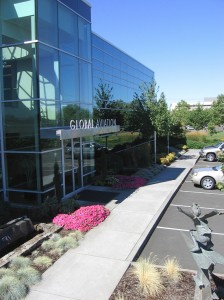
Flo Newton and her staff have built a national reputation for Global Aviation’s executive jet charter services, headquartered at Portland-Hillsboro Airport.
Newton’s headquarters welcomes visitors with a colorful 20-foot-tall, blown-glass chandelier created by Dale Chihuly, a client of Global Aviation. She provides a luxurious passenger reception and waiting area, has crew cars and rental cars available on site, offers gourmet catering for flights, plus concierge services for tenants, passengers and flight crews.
“What really sets us apart from other operations that fly the same planes to the same places is Flo’s management and emphasis on orienting all of our services to what the customer wants,” said Brian Lockhart, Global’s director of maintenance. “Among our niche markets and special services, we offer maintenance for almost the entire range of business jets, something you don’t find elsewhere in the Pacific Northwest.”
Because the airport has a prime location for flights to and from Asia, Global also worked to establish a U.S. Customs and Border Protection office.
“Flights across the Pacific use a lot of fuel, and there are significant savings by fueling here,” Lockhart said.
Global Aviation also bases planes at a Seattle hangar and Newton expects to grow that business, too.
For more information, visit [http://www.flyglobalnow.com].











